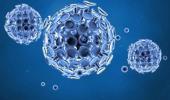The World Health Organisation has said it is 'not yet clear' whether the newly-detected coronavirus variant Omicron is more transmissible or causes more severe disease compared to other variants, including the highly-transmissible and globally prevalent Delta variant.

'There is currently no information to suggest that symptoms associated with Omicron are different from those from other variants,' the WHO said,
It added that initial reported infections were among university studies -- younger individuals who tend to have more mild disease -- but understanding the level of severity of the Omicron variant will take days to several weeks.
Amid concerns over the detection and transmissibility of B.1.1.529, designated by the WHO as a 'variant of concern', the global health organisation said on Sunday that even as researchers in South Africa and around the world are conducting studies to better understand many aspects of Omicron and will continue to share the findings of these studies as they become available, 'it is not yet clear whether Omicron is more transmissible (e.g. more easily spread from person to person) compared to other variants, including Delta'.
It said the number of people testing positive has risen in areas of South Africa affected by this variant, but epidemiologic studies are underway to understand if it is because of Omicron or other factors.
On the severity of disease caused by the variant, the WHO said, 'It is not yet clear whether infection with Omicron causes more severe disease compared to infections with other variants, including Delta.'
It noted that preliminary data suggests that there are increasing rates of hospitalisation in South Africa 'but this may be due to increasing overall numbers of people becoming infected, rather than a result of specific infection with Omicron'.
The WHO said all variants of COVID-19, including the Delta variant that is dominant worldwide, can cause severe disease or death, in particular for the most vulnerable people and thus prevention is always the key.
WHO Director-General Tedros Adhanom Ghebreyesus said the Omicron variant reflects the threat of prolonged vaccine injustice.
'The longer we take to deliver #VaccinEquity, the more we allow the #COVID19 virus to circulate, mutate and become potentially more dangerous.'
He said the WHO is working with scientists around the world to better understand key aspects of the Omicron variant and its impact on the key tools.
The global health agency also stressed that it is vitally important that inequities in access to COVID-19 vaccines are urgently addressed to ensure that vulnerable groups everywhere, including health workers and older persons, receive their first and second doses, alongside equitable access to treatment and diagnostics.
On November 26, the WHO had designated B.1.1.529, first detected in Southern Africa, as a 'variant of concern', on the advice of WHO's Technical Advisory Group on Virus Evolution (TAG-VE), and named it Omicron.
'This decision was based on the evidence presented to the TAG-VE that Omicron has several mutations that may have an impact on how it behaves, for example, on how easily it spreads or the severity of illness it causes,' it said.
Further, preliminary evidence suggests there may be an increased risk of re-infection with Omicron (i.e., people who have previously had COVID-19 could become re-infected more easily with Omicron), as compared to other variants of concern, but information is 'limited', the WHO said.
It said it is also working with technical partners to understand the potential impact of this variant on existing countermeasures, including vaccines.
'Vaccines remain critical to reducing severe disease and death, including against the dominant circulating virus, Delta. Current vaccines remain effective against severe disease and death.'
The WHO also noted that the widely used PCR tests continue to detect infection, including infection with Omicron, as seen with other variants as well. Studies are ongoing to determine whether there is any impact on other types of tests, including rapid antigen detection tests, it added.
On effectiveness of current treatments on Omicron, the WHO said corticosteroids and receptor blockers will still be effective for managing patients with severe COVID-19.
Other treatments will be assessed to see if they are still as effective given the changes to parts of the virus in the Omicron variant.
Currently, the WHO is coordinating with a large number of researchers around the world to better understand Omicron and studies currently underway or underway shortly include assessments of transmissibility, severity of infection (including symptoms), performance of vaccines and diagnostic tests and effectiveness of treatments.
'WHO encourages countries to contribute the collection and sharing of hospitalised patient data through the WHO COVID-19 Clinical Data Platform to rapidly describe clinical characteristics and patient outcomes,' the global health organisation said.
As governments rush to impose travel restrictions from countries where Omicron is prevalent, the WHO urged them to continue to implement effective public health measures to reduce COVID-19 circulation overall 'using a risk analysis and science-based approach'.











 © 2025
© 2025